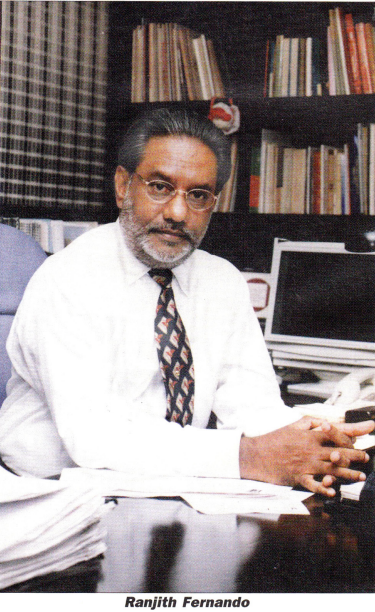
The Government’s divestiture of 16.5 million shares of NDB has resulted in further broadbasing the ownership of the National Development Bank (NDB), besides increasing its stock liquidity opines Ranjith Fernando, managing director, NDB. Excerpts from his interview with Dinesh Weerakkody.
▲ In your view, why did the government divest its shareholding in NDB?
The government’s decision was in line with its declared policy on privatization.
▲ Did the issue result in broadbasing the share ownership?
The offer for sale of 16.5 million shares of NDB held by the government has resulted in further broadbasing the share ownership of the bank and increased the liquidity of the stock.
▲ Why was this issue offered only overseas?
I doubt an offer for sale of this magnitude would have been subscribed fully, locally. In fact, the NDB offer fetched Rs 4.29 billion.
▲ A What is the local offering?
The local offering is 0.9 million shares.
▲ What would be the benefit of this share transfer?
It clarifies our balance sheet. Because we always had this overhang of government holding the debentures. Therefore, it takes away the overhang and clears our balance sheet. The share will also perform better.
▲ What was the cost for underwriting this issue?
Underwriting rates are generally standard. That is around 1% which is what all international firms charge, this is a fee that is payable in any issue.
▲ Was the underwriting fee around 200 million?
I don’t know what the total fee is, whatever 1% amounts to of the total issue is the underwriting fee of the issue.
▲ However, some analysts tend to argue that considering the strengths of NDB, it was unnecessary to engage foreign underwriters.
In an issue of this magnitude you cannot do that, you can’t take that chance of going to the market and suddenly something happening in Colombo and the issue failing. That damages the reputation of the bank. Therefore, you never go for an issue that is not underwritten in an international market. Banks in India which have gone for public issues have underwritten their shares. It is not a firm undertaking of the price, that is not what they do, it is underwriting from the date people have agreed to subscribe and the payment date. Supposing you don’t do that and an investor who agrees to take up the shares, declines due to a calamity taking place in Colombo, the whole issue would fail. This is not good for the country or for the bank. Also, we won’t be able to go for any other issue internationally after that. So it is not a risk worth taking for that price.
▲ Then, why didn’t NDB use a local firm to underwrite the issue?
If a local firm underwrote and the issue failed due to a calamity they would have had to put the money. But here are people who are worthy of the amount they underwrite. Underwriting cannot be done by a firm that has a balance sheet that does not reflect their ability to contribute that kind of funds. It has to be done by solid financial institutions.
▲ You mentioned that NDB’s privatization was in line with the government’s declared policy. But some people tend to argue that the divestiture of the government’s remaining shareholding in NDB was purely to obtain revenue to the national coffers. In this context, do you think the government achieved the declared objectives of privatization? Also, privatization is not only for revenue generation.
I agree with you that privatization is not only for revenue generation. The objectives of privatization are many. Certainly, revenue generation is one among them. For example, when the Singapore government embarks on a privatization program, it is not revenue generation, because they have enough money, but it is for certain other objectives. In this instance, the divestiture of the government was also to broadbase the ownership of the bank, getting others to invest and mobilizing funds for development purposes.
▲ Is it true that the IMF exerted pressure on the government to divest the remaining shareholding in NDB?
No, I don’t think so and not to my knowledge. IMF had nothing do with NDB privatization.
▲ In most NICs, the role of the development bank had been to provide low-cost funds for the industrial sector and NDB was also set up for this purpose. My question is now that NDB is privately owned, will the objective mentioned above, be achieved?
It is not low-cost funds. You can’t provide low-cost funds unless we receive low-cost funds. Where do you raise these low-cost funds from? We have to raise funds from the market. It is development capital that we provide. Even though now we are privately owned the Act of NDB remains. In the Act our objectives are clearly stated. That is, that we should promote private sector industries and develop the capital market of Sri Lanka. Those objectives remain even though we are now privatized. So, there is no going away from those objectives.
▲ Now that foreign share holders have 50% of the share capital. Would your lending be affected?
The total lending will still go to locals. We are not lending overseas.
▲ Also, won’t your concessionary loans from the government be affected with their divestiture.
We never got low- cost funds from the government. There were ADB and World Bank credit lines. They came to the government at low interest. When we got them, we got them at market rates. This is a misconception of development banks. People expect low-cost funds from development banks, that is the old model of development banks. After the 2nd World War development banks were given low-cost funds to lend low to the industry to resuscitate the industry that was ruined as a result of the war. That thinking has now changed.
▲ Is NDB the apex body for sourcing funds from overseas?
Not on all funds. We have been playing an apex role for the SMI scheme.
▲ Can this role be continued?
We will continue that role.
▲ In most NICs, the development banks are lending around 6%. Please comment.
That is because inflation is low and their interest rate structure is low. Their depositors are paid 2% so they can lend at 6%. In Sri Lanka you pay depositors 13 or 14%. Why do banks pay that? Because otherwise people won’t deposit their money. After inflation, at the end of the year depositors will receive a negative return, if banks don’t compensate them with high interest rates. So, if a bank pays 13 or 14%, how can they lend below that. If we are to bring down interest rates. We have to bring down inflation. The government is trying to do that. The interest rates are at a much lower level than we are used to.
▲ But then the ADB is lending to the Government at 0.75%?
Yes, they lend to the government at 0.75%. The government takes their funds and repays after 40 years. At the time of repayment the US Dollar and Rupee Conversion would have changed. Therefore, the government must take the risk if the Rupee depreciates. Due to this the government lends to us at 12 or 13% and not at 0.75%
▲ How do you source your funds for lending?
We borrow abroad. Locally, we borrow from provident funds, NSB and other financial institutions. Recently, we raised a 50 million US Dollar loan from a Syndication of Banks abroad and those were at market rates.
▲ So at any stage NDB has not received soft loans from the government?
Absolutely not, the money we got from the government was the Rs 450 million we got when the bank was set up. That was our capital. Compared to that, our lending is around 21 billion.
▲ If we are going to maintain high lending rates, how on earth are we going to develop our Industrial Sector?
You can’t, that is why the government is making every effort to bring down the interest rates. In fact, rates have come down.
▲ What role can the NDB take on to bring down the lending rates.
I think we also should cut down our margins, be more efficient. Banks in Sri Lanka are used to high margins, they add about 4% to the cost of funds. NDB has however dropped those margins substantially. We work on 1-2% margins. That is our way of contributing. The basic problem of high interest rates is inflation. Once you bring down inflation, the whole level of interest has to be brought down. If inflation is low, and we can mobilize funds at 2% like in Singapore, we can lend at 4%. In fact the inflation rate in Singapore this year is 3% and they are howling about it, because they are used to 1%. Here we have been used to 20%.
▲ How about NDB’s loan provisions?
We may be the only bank that makes a general provision of 3% on all our loans across-the-board. Good or bad we make that provision. Our provisions are the highest in the country.
▲ In relation to non-performing loans. What would be the percentage when compared to your total assets?
Normally, we have been used to about 6 or 7 % as non-performing loans. That is not a write-off, they are only loans in arrears. Our provision went up in the last two years, due to problems in the country So, we had non-performing loans rising to around 10%. Now, it is back to 8%. In fact, our actual write-off has been 0.04% in one year and 0.10% in another year. So our actual write-off is very small. We have security on those loans, even on the loans that go bad. We realize security and many a time, we realize more than what we have lent.
▲ On a general note, what would be the position of NDB’s investment in local companies, now that NDB is privately owned?
We will continue to play the same development role in those companies.
▲ Is NDB planning to infuse foreign expertise to its management?
Not foreign management. Wherever we need expertise, we would get it from our strategic partners. Now, for instance we have formed joint ventures with our strategic partners. Definitely we will get needed, so that we can play an international role.
▲ A What are NDB’s plans for the future?
We have great plans. We are going into several new products. Then we are going into a branch expansion program. We have a five-year-plan. In 5 years the bank will be a different institution.
▲ Also will NDB move into areas of commercial banking?
Today, the distinction between commercial banking and development banking is just funding. For instance, take the Development Bank of Singapore, which started off as a development bank. Today it is one of the largest commercial banks. So, we don’t see any reason why we should not get into any commercial banking activities in order to assist our clients. So wherever it makes sense in order to serve our clients, we would certainly move into commercial banking activities.
▲ Lastly, will NDB continue to support the government on all special development projects?
If the government requests us to support a special project, we would certainly support it, provided it is viable, we have the independence to evaluate and is within our limits.
Dinesh Weerakkody is manager in a commercial bank. He is the author of Selected Essays on Foreign Affairs Part 1 and Part 2.



